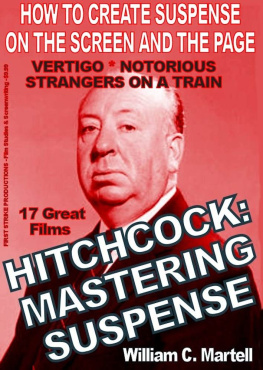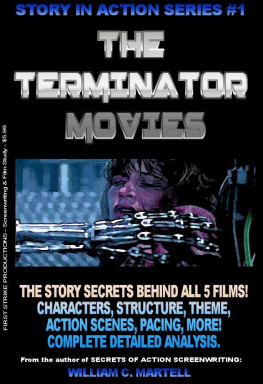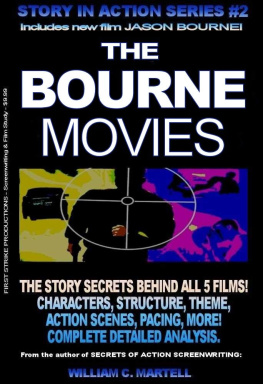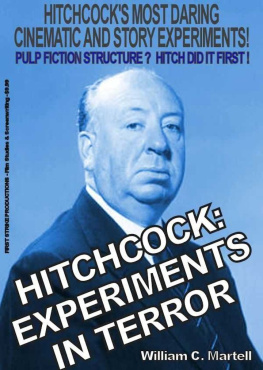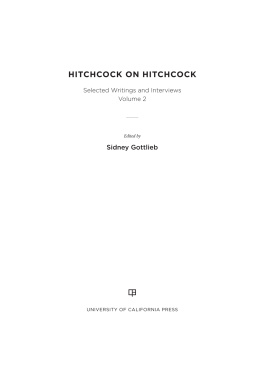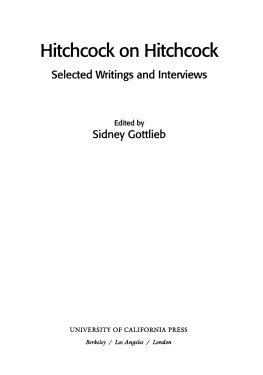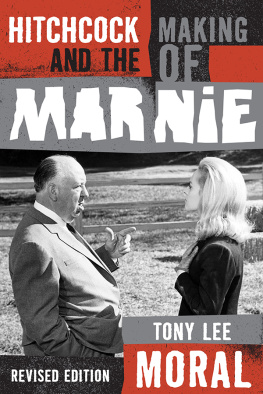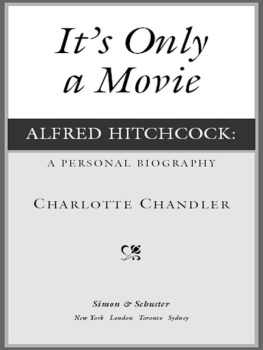William C. Martell - Hitchcock: Mastering Suspense (Hitch For Writers Book 2)
Here you can read online William C. Martell - Hitchcock: Mastering Suspense (Hitch For Writers Book 2) full text of the book (entire story) in english for free. Download pdf and epub, get meaning, cover and reviews about this ebook. year: 2016, publisher: First Strike Productions, genre: Romance novel. Description of the work, (preface) as well as reviews are available. Best literature library LitArk.com created for fans of good reading and offers a wide selection of genres:
Romance novel
Science fiction
Adventure
Detective
Science
History
Home and family
Prose
Art
Politics
Computer
Non-fiction
Religion
Business
Children
Humor
Choose a favorite category and find really read worthwhile books. Enjoy immersion in the world of imagination, feel the emotions of the characters or learn something new for yourself, make an fascinating discovery.
- Book:Hitchcock: Mastering Suspense (Hitch For Writers Book 2)
- Author:
- Publisher:First Strike Productions
- Genre:
- Year:2016
- Rating:3 / 5
- Favourites:Add to favourites
- Your mark:
- 60
- 1
- 2
- 3
- 4
- 5
Hitchcock: Mastering Suspense (Hitch For Writers Book 2): summary, description and annotation
We offer to read an annotation, description, summary or preface (depends on what the author of the book "Hitchcock: Mastering Suspense (Hitch For Writers Book 2)" wrote himself). If you haven't found the necessary information about the book — write in the comments, we will try to find it.
Hitchcock: Mastering Suspense (Hitch For Writers Book 2) — read online for free the complete book (whole text) full work
Below is the text of the book, divided by pages. System saving the place of the last page read, allows you to conveniently read the book "Hitchcock: Mastering Suspense (Hitch For Writers Book 2)" online for free, without having to search again every time where you left off. Put a bookmark, and you can go to the page where you finished reading at any time.
Font size:
Interval:
Bookmark:
HITCHCOCK:
MASTERING SUSPENSE
by
William C. Martell
FIRST STRIKE PRODUCTIONS
Hitchcock: Mastering Suspense
First Edition
ISBN:
Copyright 2016 by William C. Martell
All rights reserved. No part of this book may be reproduced or transmitted in any form or by any means, electronic, mechanical, or telepathic, including photocopying, recording, or any information and retrieval system, without the prior written permission of the Writer, except by a reviewer who may quote brief passages in a review.
First Strike Productions
11012 Ventura Blvd #103
Studio City, CA 91604
http://www.ScriptSecrets.Net
AFTERWORDS
The first British sound film was a thriller Blackmail (1929), about a woman who accidentally kills a man, then falls in love with the detective investigating the crime. It was directed by a young man named Alfred Hitchcock whose name would become synonymous with thrillers for five decades. Hitchcock has been called the Master Of Suspense, and well look at his work in the Thriller Genre and his use of suspense in seventeen of his films, including my favorite film Notorious and at least a couple you may not have heard of. For me, part of the fun is introducing you to one of Hitchcocks lesser known films like the original Man Who Knew Too Much with Peter Lorre or even the brilliant The 39 Steps which is the prototype for North By Northwest and probably the James Bond series. Some of you have probably seen The 39 Steps, others may have never heard of it, even though its one of Hitchcocks bests.
In the previous book in this series Experiments In Terror we looked at Hitchcocks amazing story and cinematic experiments, in this book were going to look at some of his most suspenseful films as well as the elements that create suspense. We will also look at other story elements as well, because a large part of suspense is audience identification and involvement in the story itself. If you dont care about the characters or the story, all of the suspense techniques in the world arent going to put the audience on the edge of their seats. And though I am a screenwriter, many of the lessons and techniques we will be looking at will focus on film; they all work in prose as well. Novelists and probably those who do any other form of writing can get something out of these Hitchcock techniques.
Because I love suspense films and thrillers, and have had a handful actually produced, its no surprise that Ive always been a big fan of Hitchcocks films. Difficult to work in the thriller genre without being influenced by Hitch - he was the trail blazer for just about every film maker we have today and probably the most recognized film director in the world - due to hosting duties on his TV show. The first director the *audience* recognized. You can watch any Spielberg film and see some trace of Hitchcock, from the dolly-zoom in Jaws to that scene they never shot for North By Northwest at the auto assembly-line that shows up in Minority Report. No director since has understood that language of film like Hitchcock, and I fear we may be losing this language as more and more directors would rather use a cool shoot than the shot that makes the audience feel something. Hitchcock told stories visually - there are often long sequences in his films without dialogue which manage to give us deep information about characters and story.
Hitchcock began as a writer in silent movies - he was the one who wrote the title cards and illustrated them. He became an art director and assistant director... and eventually they let him call the shots. He married a film editor and screenwriter, Alma Reville, who probably advised him on story and film throughout his career - they were partners. He also worked with the best screenwriters in the business throughout his career, and treated them very much as he treated his actors. No, not like cattle. Hitch would allow his actors to do whatever they wanted creatively as long as they hit their marks so that theyd be in frame and in focus. Ernest Lehman said in an interview that after he discussed the story with Hitchcock, he was sent away to write it while Hitchcock worked on another project. There was no micro-managing, no excessive development, not much rewriting. Hitchcock hired the best writers and allowed them to do their best work without looking over their shoulders. This sort of creative freedom is unusual, and also means these great films can be traced back to some great screenwriters. Film may be a directors medium, but as the famous story goes about auteur Ernst Lubitsch, a director cant put his mark on 110 blank pages of paper.
This book (and its two siblings) began as a series of blog entries. Since the Master of Suspense made 52 films and I have managed to see all of the existing films projected on the big screen at least once in my life, I thought it would be easy to turn out a 5 page (1,250 word) entry on each of the films every week in my spare time for my blog. Those 5 page entries would add up to a single book. Except the films were so fascinating and filled with experiments and story lessons that the entries ballooned to as much as 4,500 words (18 pages). Yikes! Those entries took almost a whole week to write, so they didnt end up some easy blog filler... but a lot of danged hard work. Oh, and Im a professional screenwriter with producers calling me wondering wheres the next draft of the assignment Im being paid to write. So the Hitchcock blog entries became an irregular, spare time thing. And that one book became *three* books with the blog entries further expanded to explore the subjects of each book: Experiments In Terror on his experimental films, this book Mastering Suspense on creating suspense and writing thrillers, and The Script, The Script, and The Script! a general screenwriting book that will use Hitchcock films as examples of structure and dialogue and all of the other disciplines needed to write a screenplay.
I think this book may be best enjoyed by reading about the movies and then viewing them again and looking for the great suspense scenes weve explored. The entries arent *only* about suspense, as long as were looking at the movies why not look at the great scenes and some other cool trivia? And some entries contain a personal story about the film - hey, its my book! Even the worst Hitchcock film (and there are some stinkers) contain some great suspense scenes and some interesting characters. What can we learn from these films? Lets start by looking at suspense and the Thriller Genre...
- William C. Martell
Studio City, CA April, 2016
- Unusual Ticking Clock, Focus Objects, and Subtext as well as how Story DNA works and using Mystery in your opening scene.
- Visual Storytelling, Creating Suspense With Ticking Clocks, the Minor Mischief Trick, Interesting Locations, Magnification in story, and Accidental Murder.
- Transference Of Guilt, Sound Triggers, Suspense, POV in scenes, Contrast & Tension.
- Plot Twists & Reversals, Small Sins and Thriller Patterns, Action Scenes & Spectacle, Story In Story, MacGuffins and Full Circle Endings.
- Establishing Mood, Negative Cinderella, Secrets and Reveals, and Character Trios Create Shifting Alliances.
- Alliances, Allegiances, Adversaries. Opening 10 pages.
- Hitchcock Wipes, World Of The Story, Hero & Villain Flipsides, Character Flaw creating story, Set Ups, and Traditional Twist Endings.
- Set Pieces, Speeches, Gags, and Leading the Audience.
- Contained Thrillers, Avoiding Claustrophobia, Point Of View And Suspense, Implied Sound and one of Hitchcocks most interesting visual experiments from the silent period.
- Visual Links, Unseen Threats, Building Suspense.
Font size:
Interval:
Bookmark:
Similar books «Hitchcock: Mastering Suspense (Hitch For Writers Book 2)»
Look at similar books to Hitchcock: Mastering Suspense (Hitch For Writers Book 2). We have selected literature similar in name and meaning in the hope of providing readers with more options to find new, interesting, not yet read works.
Discussion, reviews of the book Hitchcock: Mastering Suspense (Hitch For Writers Book 2) and just readers' own opinions. Leave your comments, write what you think about the work, its meaning or the main characters. Specify what exactly you liked and what you didn't like, and why you think so.

